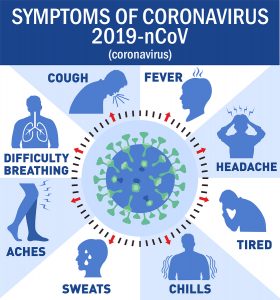Posted on Friday, 17th April 2020 by Dennis Damp
 Print This Post
Print This Post
The Coronavirus Aid, Relief, and Economic Security (CARES) Act is providing support for those most impacted by the pandemic. Congress passed the Act last month and one of the key provisions is providing for Economic Impact Payments to American households. Payment of up to $1,200 per adult for individuals whose income was less than $99,000 (or $198,000 for joint filers), and $500 per child under 17 years old – or up to $3,400 for a family of four will be arriving soon. Your Adjusted Gross Income will be determined by your 2019 tax filing (or 2018, if 2019 is unavailable).

Request Your Personalized Federal Retirement Report™ Today
The amount of the payments will be reduced for those with higher incomes. For individuals filing taxes as singles, the reduced amount begins at an adjusted gross income (AGI) of $75,000 per year and is completely phased out at $99,000. For joint filers, the reduced amount begins at $150,000 and payment is eliminated at $198,000.
The IRS will use the information on the Form SSA-1099 for Social Security recipients, and Form RRB-1099 for Railroad Retirement Board recipients, to generate $1,200 Economic Impact Payments for those who didn’t file a tax return in 2018 or 2019. Recipients will receive these payments as a direct deposit or by paper check, just as they would normally receive their benefits.
For those who do not have their income tax refund automatically sent to their checking or savings account, the Treasury launched a web-based portal for individuals to provide their banking information to the IRS online. Individuals can receive payments immediately as opposed to waiting for checks in the mail.
RMD Waiver
Required minimum distributions (RMDs) for 2020 have been waived for 401(k), 403(b), and governmental 457(b) plans as well as SEP IRAs, SIMPLE IRAs, and traditional IRAs. The Thrift Savings Plan announced last year that RMDs would be automatically sent if a participant doesn’t request one during the year. That has changed under the CARES Act, I called the TSP today and they confirmed that RMDs won’t be automatically sent out this year. If you decide you want to make a withdrawal this year, call the TSP at 1-877-968-3778.
The reason some prefer to waive their RMD is to reduce taxes and to possibly prevent their Medicare part B premiums from increasing. Medicare Part B premiums are income adjusted and an RMD could raise your income just enough to increase your Medicare premium next year.
For those who already elected to take their RMD earlier, call the TSP or other retirement account providers to see whether you’re eligible. You may be able to return the funds to your retirement account.
The 10% early withdrawal penalty is now waived on aggregate distributions of up to $100,000 from certain workplace retirement plans and individual retirement accounts (IRAs) for COVID-19-related purposes. Individual can elect to pay the federal income tax on the distribution over 3 years or they have the option to repay the distribution within a 3-year period to an eligible retirement plan. This option isn’t available for TSP participants at this time.
CARES Act Summary
- The deadline for filing and payment of 2019 federal income taxes has been moved from April 15 to July 15, 2020, by the Internal Revenue Service (IRS). The July date will also be the deadline to make 2019 contributions to IRAs and health savings accounts (HSAs). Deadlines associated with contributions to workplace savings plans are not affected.
- Direct payments of $1,200, or $2,400 for joint filers, plus $500 for each child may be coming your way as discussed in the introduction.
- Some retirement account rules have been relaxed. In addition to the RMD discussion in the introduction, certain beneficiaries taking distributions from inherited IRAs may also skip the 2020 distribution when calculating their 5-year distribution period. Also, loan repayments for affected participants in workplace retirement plans may be delayed for one year. These changes will be in effect through 2020.
- Paid sick and family leave available for more workers. OPM has issued a fact sheet titled, “Federal Employee Coverage Under the Leave Provisions of the Families First Coronavirus Response Act.” Federal employees should review this new guidance. There are enhancements to the “Emergency Family and Medical Leave Expansion Act” that working parents need to be aware of.
- Paid leave is required for more employees by the Families First Coronavirus Response Act. These provisions apply to businesses of 500 employees or less. Businesses with 50 employees or less may be exempt from the paid leave provisions.
- Unemployment insurance has been expanded.
- Tax credits for the self-employed may be available.
- Interest is waived for Federal student loan payments.
- More funding is now available for health care and expanded coverage. Testing for COVID-19 must be covered by private health insurance without cost sharing. Any vaccines for COVID-19 must be covered as well without cost sharing. This act expands coverage of telehealth services under Medicare. It also allows high-deductible health plans with health savings accounts (HSAs) to cover telehealth services even if patients have not met their annual deductible. For health savings accounts, health flexible spending accounts, and health reimbursement arrangements, the act includes over-the-counter (OTC) medicines (without a prescription) and feminine products as qualifying medical expenses that can be reimbursed by these accounts. Check with your FEHB provider if you have specific questions.
- Above-the-line deduction for charitable contributions. The CARES Act allows for a $300 above-the-line deduction for cash charitable contributions made to 501(c)(3) organizations for taxpayers who take the standard deduction. These changes go into effect beginning in the 2020 tax year.
You can review and/or download the Act online if you wish to do a comprehensive review. I’ve written several articles centered around this pandemic over the past 7 weeks that you may find interesting:
- Avoid Retirement Processing Delays (Update) April 10, 2020
- Keeping Up to Keep Up – The Saga Continues April 3, 2020
- Federal Retirees Needed to Provide COVID19 Support March 29, 2020
- Hunkered Down for the Duration – A Retiree’s Perspective March 24, 2020
- The Investment Dilemma – Walk, Don’t Run to the Exit March 16, 2020
- The Sky is Falling! The Coronavirus – What to Do. March 12, 2015
Request a Federal Retirement Report Retirement planning specialists provide a comprehensive Federal Retirement Report™ including annuity projections, expenditures verses income, with a complete benefits analysis. This comprehensive 27-page benefits summary will help you plan your retirement.
Request Your Personalized Federal Retirement Report™ Today
Find answers to your questions: The best time to retire, retirement income vs expenditures, FEGLI options and costs, TSP risks and withdrawal strategies, and other relevant topics. Determine what benefits to carry into retirement and their advantages. You will also have the opportunity to set up a personal one-on-one meeting with a CERTIFIED FINANCIAL PLANNER. Helpful Planning Tools
- 2020 GS Pay Scales
- Retirement Planning For Federal Employees & Annuitant
- Federal Employee Retirement Benefits Seminars – Check Availability
- Financial Planning Guide
- Budget Work Sheet
- Medicare Guide
- Social Security Guide
- Master Retiree Contact List (Important contact numbers and information)
- 2020 Leave and Schedule Chart (Use this chart to set target retirement dates.)
- Annuity Calculator (FREE Excel chart estimates annuity growth)
Disclaimer: Opinions expressed herein by the author are not an investment or benefit recommendation and are not meant to be relied upon in investment or benefit decisions. The author is not acting in an investment, tax, legal, benefit, or any other advisory capacity. This is not an investment or benefit research report. The author’s opinions expressed herein address only select aspects of various federal benefits and potential investment in securities of the TSP and companies mentioned and cannot be a substitute for comprehensive investment analysis. Any analysis presented herein is illustrative in nature, limited in scope, based on an incomplete set of information, and has limitations to its accuracy. The author recommends that retirees, potential and existing investors conduct thorough investment and benefit research of their own, including detailed review of OPM guidance for benefit issues and for investments the companies’ SEC filings, and consult a qualified investment adviser. The information upon which this material is based was obtained from sources believed to be reliable, but has not been independently verified. Therefore, the author cannot guarantee its accuracy. Any opinions or estimates constitute the author’s best judgment as of the date of publication, and are subject to change without notice. The author explicitly disclaims any liability that may arise from the use of this material.
Last 5 posts by Dennis Damp
- Your 2026 Step-by-Step Federal Retirement Planning Guide - February 19th, 2026
- Online Retirement Application (ORA) Update - February 13th, 2026
- The End to the Silver Script Madness – News Flash - February 7th, 2026
- Reflections 2025 – Marvin Gaye (What’s Going On) - January 30th, 2026
- The Federal Workforce Data (FWD) Release – OPM Update - January 23rd, 2026
- Savings Bond Calculator & Treasury Direct Inefficiencies! - January 15th, 2026
- Tax Forms Availability – What to Expect This Year - January 9th, 2026
- The 2026 Landscape: What to Expect and Outlook - January 1st, 2026
- Long Term Care Insurance - Future Purchase Option - December 12th, 2025
- Open Season Coming to a Close – Last-Minute Checkup - December 2nd, 2025
- I Rolled Over My TSP Account to an IRA – Should You? - November 21st, 2025
- The 2026 FEHB & PSHB Open Season Selection Guide - November 6th, 2025
Posted in ANNUITIES / ELIGIBILITY, BENEFITS / INSURANCE, ESTATE PLANNING, FINANCE / TIP, RETIREMENT CONCERNS, SOCIAL SECURITY / MEDICARE, SURVIVOR INFORMATION, UNCATEGORIZED | Comments (0)
 Print This Post
Print This Post

